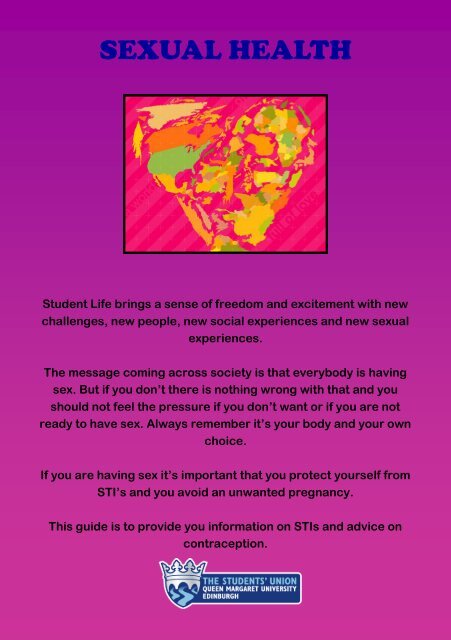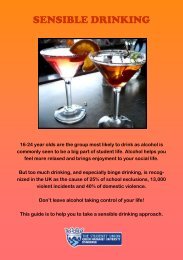Sexual Health Booklet - Queen Margaret University Students
Sexual Health Booklet - Queen Margaret University Students
Sexual Health Booklet - Queen Margaret University Students
You also want an ePaper? Increase the reach of your titles
YUMPU automatically turns print PDFs into web optimized ePapers that Google loves.
SEXUAL HEALTHStudent Life brings a sense of freedom and excitement with newchallenges, new people, new social experiences and new sexualexperiences.The message coming across society is that everybody is havingsex. But if you don’t there is nothing wrong with that and youshould not feel the pressure if you don’t want or if you are notready to have sex. Always remember it’s your body and your ownchoice.If you are having sex it’s important that you protect yourself fromSTI’s and you avoid an unwanted pregnancy.This guide is to provide you information on STIs and advice oncontraception.
1. STIsThe bad thing about sex is that you can catch and/or pass on <strong>Sexual</strong>lyTransmitted Infections (STIs) whoever you are having sex with. STIs are abacterial or viral infection and much more common than what we think.You can’t tell by looking at someone whether they have a STI or not. So itis important to know the signs and symptoms.Bear in mind that signs can go unnoticed for a long time and some peopledon’t have symptoms of STIs so it’s worth getting tested even if you feelhealthy.If you think you have a STI don’t panic, most STIs can be treated andcured.1.1 STIs – A to ZHIVHIV is a virus that attacks the body’s immune system which defends ourbody against illness. It is found in infected blood, semen or vaginal fluid.HIV can develop into AIDS meaning the body is no longer able to protectitself against infections and diseases.HOW DO YOU GET IT? Unprotected sex with HIV positive person Shared needles or other injecting equipment Mother to baby during pregnancy or breastfeedingSYMPTOMSSymptoms usually appear around 10 days after infectionFever and FatigueRashWeight lossNight sweatsSevere sore throatChest and skin infectionsTREATMENTDrugs and medications are available to treat HIV. It aims to slow down orstabilize the progress of the HIV infection.HIV CANNOT BE CURED
Hepatitis CHepatitis C is a virus that causes inflammation of the liver and further longtermhealth problems. As many as 9 out of 10 people don’t know they havehepatitis C.The infection is often chronic however in most cases few symptoms occur.HOW DO YOU GET IT? Unprotected sex Shared needles or other injecting equipments Mother to baby during pregnancy or breastfeeding Getting a tattoo, piercing or receiving medical or dental treatmentwith unsterilized equipment Sharing a toothbrush or razorSYMPTOMS Flu-like illness : tiredness, nausea, vomiting, aching muscles Lack of interest in food and weight loss Darker urine and jaundiceTREATMENTDrugs can be used to treat hepatitis but is not always effectiveSyphilisSyphilis is an old STI making a comeback today and is on the rise in the UKHOW DO YOU GET IT? Unprotected sexSYMPTOMSSyphilis infection goes through different stages of symptoms1 st stage:An ulcer appears about 2 to 6 weeks after being infected but many peopledo not notice it. the ulcer disappears several weeks later without treatmentbut the disease is still here and comes to stage 2.2 nd stage: A skin rash appears with brownish sores Sore throat, fever and headache3 rd stage ( less likely to appear) Blindness Heart disease Mental illness
TREATMENTSyphilis can be treated with antibiotics. An injection of penicillin kills thebacteria within 24 hours.=> 50% of infected men and 80% of infected women have no symptoms atall!ChlamydiaIncreasing among young people, Chlamydia is one of the most commonSTIs but it is easy to be treated.HOW DO YOU GET IT? Unprotected sex Mother to baby during pregnancySYMPTOMSSymptoms appear 7 to 21 days after the infection.Males Stinging sensation when peeing White/cloudy discharge from the penis Pain or tenderness in the testiclesFemales Peeing stings Unusual vaginal discharge Pain during sex Bleeding between periods Heavy periods Pelvis and lower abdomen painComplicationsMales: damage to testicles, sterility, infection to prostate and Reiter’ssyndrome (arthritis and sore eyes)Females: infection of the womb and fallopian tubes, infertility, increasedrisk of ectopic pregnancy, liver inflammation and Reiter’s syndromeTREATMENTChlamydia can be treated by antibiotics.GonorrhoeaGonorrhoea is an infection caused by a bacteria like Chlamydia. It is lesscommon but young people are at the greater risk.
HOW DO YOU GET IT? Unprotected sexSYMPTOMSSigns usually start 2 to 10 days after the infectionPainful urinationYellowish, greenish or creamy discharge from the penis or the vaginaFrequent need to peeTenderness in testiclesSore throat and feverHeavy periods or bleeding between periodsComplications: infertility and inflammation of the pelvis or testiclesTREATMENTA single dose of penicillin will treat gonorrhoeaGenital HerpesGenital Herpes is a virus that can not be cured.There are two strands of the virus: Herpes simplex type 1 causes cold sores around the mouth andcan affect the eyes Herpes simplex type 2 infects the skin around the genitalsHOW DO YOU GET IT? Unprotected sex Mother to baby during pregnancySYMPTOMS Small watery blister around the genitals that can leave painfulsores, ulcers or crusts Fever, headache and aching muscles=> Most people won’t have herpes crisis more than once but it can becomeactive again if you are run down or stressedTREATMENT Herpes cannot be cured but antiviral tablets and liquids are availableto help contain a herpes outbreak Pain and fever is best treated with paracetamol and bed rest
Hepatitis BHepatitis B is a virus that causes inflammation of the liver.HOW DO YOU GET IT? Unprotected sex Contaminated needles Tattoo or piercing unsterilized equipment Shared towels, toothbrushes and nail clippers Mother to baby during pregnancySYMPTOMS Flu like illness: nausea, vomiting, aching muscles Lack of interest in food and weight loss Jaundice and darker urineComplications:long term liver damageTREATMENTIn most cases, you don’t need any treatment to recover from the infectionTHE ONLY WAY TO PROTECT FROM STIs IS TO USE CONDOMS1.2 STIs- How to get tested?<strong>Sexual</strong> <strong>Health</strong> checks are free everywhere in the UK.If you think you are infected by an STI get tested.Method to get tested may vary: Swab from the cervix or tip of penis Blood sample Wee sampleGetting tested don’t hurtYou can talk to an advisor before doing the testIt can be done at various medical places: Some GP surgeries <strong>Sexual</strong> health clinic or GUM clinic Some community contraceptive clinics Some young people’s services
All services are completely confidential and non judgmental.If you are tested positive don’t panic, most STIs are treatable. Your clinicwill help you to talk to your current and previous partner(s) so that theyget tested too.You can find your local medical service on www.nhs24.com2. CondomsIf you have sex you should make sure you protect yourself and your partneragainst STIs. The only way to protect against STIs is to use a condom.With a long term partner you should stop using a condom only if you are100% sure none of you has a STI.You should ensure you always have condoms with you when you are goingout so that you are not in a situation when you need one but don’thave it.2.1 Male and Female CondomsFemale Condoms (up to 95% effective)Female condoms are put inside the vagina before having sex to stopsperm getting into the womb.BENEFITS Female condoms protect against STIs as well as pregnancies It’s suitable for most women It does not cause any allergyMale Condoms (98% effective)Male condoms are made from thin latex, polyisoprene or polyurethaneand help to protect from pregnancies and STIs.It covers the penis and acts as a barrier to stop the sperm coming intocontact with the partner’s genital. It has to be put on when the penis iserect and just before to have sex.Male condoms come in different sizes, shapes, colours, textures and flavoursso there will be one that suits you. Many people find putting on acondom an enjoyable and fun part of sex.You may wish to use lubricant to reduce friction during sex. Ensure youare using a water based lubricant if you use a lubricant; do not use oilbased products as it can damage latex condoms.
BENEFITS Condoms are easy to use and do not have any side effects Condoms are the only method for men to control their fertilityAlways check that condoms you buy have a BSI or CE mark (high safetystandards) on the packet and the use by date is not exceeded.It must be stored in places not too hot or too cold and away from sharp orrough surfaces that could tear them or wear them away.Read careful instructions before using a condoms for the first time. condomscan split if not used properlyWomen having sex with a man are advised to use another method of contraceptionas well in case the condom splits or comes off.2.2 C CARDYou can get free condoms from different places: Community contraceptive clinics <strong>Sexual</strong> health Genitourinary medicine clinics Young people services Your <strong>Students</strong>’ UnionYou can also buy condoms in: Chemist Petrol station Machines in public toilets, bars and clubs OnlineYour <strong>Students</strong>’ Union is a C CARD point.C CARD is a service provided by NHS Lothian which offers free condoms.Any QMU students can access the C Card service.The service is free and confidential. You don’t even need to give yourname. All you need to do is to come to register in the Welfare Point (in theSU Office building). You will only be asked your date of birth and the firstpart of your post code. This information is for records and monitoring purposes.Once you are registered, you will receive a card which will allow you toget free condoms when you need them just by showing your card
3. ContraceptionWomen who are having sex with men and don’t want to get pregnant areadvised to use contraception. There are many methods of contraceptionto choose from and you don’t need to pay for it. So don’t be put off if thefirst thing you use is not suitable for you. If you are unsure you can askyour GP or a nurse for advice.Some contraception methods may not be suitable for some women. Beforeprescribing you any contraceptive, your doctor or nurse will ask yousome questions on your health and your family’s medical history.In most cases, it is advised to use condoms in the first seven days you arestarting a new contraceptive. Some methods may not protect you againstpregnancies immediatelyContraception does not protect from STIsAlways use a condom when you have sex3.1 Contraception A to ZCaps (up to 95% effective)Caps are small circular dome made of thin, soft latex or silicone to be insertedinto the vagina before you have sex (no more than 3 hours earlier).It covers the cervix so that sperm does not get into the womb.To be effective, you must put spermicide on the cap and leave the cap inplace for 6 hours after sex. Once you take out the cap you can wash it andreuse it.There are different sizes so you must be fitted for the correct size by atrained doctor or nurse.BENEFITS It is not affected by any medicines You can’t feel it when you have sex It does not disturb your menstrual cycleINCONVENIENCES If you lose or gain more than 3kg in weight, have a baby, miscarriageor abortion, you may need to be fitted with a new cap.
Combined pill (more than 99%)The combined pill is a tablet containing oestrogen and progestogen, twohormones naturally released from the ovaries that prevent from ovulatingand from the egg to implant.The pill must be taken every day for 21 days then stopped for 7 days duringwhich you have a withdrawal bleed and you keep being protectedagainst pregnancy. After these 7 days you must start again the pill.There are lots of different pills so there’s surely one for you.BENEFITS Bleeding is lighter, shorter and less painful Protect against cancers of the ovary, womb and colon Reduce spotty skinINCONVENIENCES Must be taken according to instructions (same time everyday) Not effective if you are sick (vomiting or diarrhoea) Effectiveness may be reduced by other medications Not suitable if you are over 35 and a smoker Low risk of blood clots and cervical cancer Mood swings, breast tenderness and headachesContraceptive Implant (more than 99.9% effective)Implants are small flexible tubes containing progestogen; hormone thatstops the release of eggs from the ovary. It is inserted under the skin ofyour upper arm and lasts for three years.BENEFITS You don’t have to think about it every day for three years Not affected by other medications Useful for women who can’t use contraception with oestrogen Can be removed at any timeINCONVENIENCES Some discomfort Your periods may become irregular or stop Effectiveness may be reduced by medicinesYou need a professional to give them to you. The doctor or nurse will giveyou a local anaesthetic injection to insert in your arm the implant. It takesonly a few minutes.
Contraceptive injection (more than 99% effective)Contraceptive injection is made of progestogen. It is injected in the upperarm and protects against pregnancy for 8 to 12 weeks. It stops the spermfrom reaching an egg and the egg to implant itself. It may also stop ovulation.BENEFITS Last for 12 weeks You don’t have to think about it every day Useful if you can’t use contraception with oestrogen It is not affected by medication Protect against cancer of the womb and pelvis inflammationINCONVENIENCES Weight gain, headaches, mood swings, breast tenderness Irregular bleeding for 3 weeks Can’t be removed from your body for 12 weeks Fertility may take long to return to normal after the injection wearsoff It can thin the bones Follow up injection must be given on timeContraceptive patch (more than 99% effective)The contraceptive patch delivers oestrogen and progestogen into thebody through the skin. It works as the combined pill. One patch is kept for7 days and changed every week for three weeks followed by a week off.It must be stuck on a clean and dry skin.BENEFITS You don’t need to think about it every day Protects against cancers of the ovary, womb or colon You can wear it in the bath, swimming pool and while playing sport Can be worn on most areas of the body Periods are more regular, lighter and less painfulINCONVENIENCES Increasing blood pressure, headache Not suitable if you are over 35 and a smoker It may cause skin irritation If you lose or forget to re apply your patch with 48hours of taking itoff you could be at risk of getting pregnant
Diaphragms (92-96% effective)A diaphragm is a circular dome made of thin, soft latex or silicone. It isput into the vagina before sex and covers the cervix so that sperm doesnot get into the womb.It must be used with spermicide and be left in place at least 6 hours aftersex. You can wash it after use and re use it.It comes in different size so you must be fitted by a doctor or a nurse.BENEFITS No serious health risk You only have to think about it when you have sex You can put it in several hours before you have sex You can’t feel it when you have sex It does not disturb your menstrual cycleINCONVENIENCES If you lose or gain more than 3 kg, have a baby, a miscarriage orabortion you may need to be fitted with a new diaphragmIntrauterine device (more than 99% effective)An Intrauterine device (IUD) is a small T shaped plastic or copper deviceinserted into the uterus by a health professional. It prevents sperm fromsurviving into the cervix, womb and fallopian tubes and eggs to implant inthe womb.IUD can last up to 10 years. None of them have any hormones and thereare various types and sizes available.BENEFITS You don’t have to think about it every day You can use it whether or not you have had children It can be removed at any time Return to normal levels of fertility is quick It works immediatelyINCONVENIENCES Changes to your periods in the first months Periods heavier, longer and more painful Very small chance of infection in the first 20 days Not suitable if you have had pelvic infections
Risk that your body may expel itDiscomfort at the beginningIt takes about 15-20minutes to be put in and can be uncomfortable orpainful for some women. local anaesthetic and painkillers may be used toreduce the pain.You will have to go back to the doctor to check it has been well fitted. thedoctor will explain you how to check it is well fitted so that you can do ityourself once a month.Intrauterine System( more than 99% effective)IUS is a small T shaped plastic device containing progestogen insertedinto your uterus by a specialist to prevent sperm to reach an egg andeggs to implant in the womb. it lasts for 5 years.BENEFITS You can use it whether or not you have had children It can be removed at any time and fertility is quick to return It makes periods lighter, shorter and less painful You don’t have to think about it every day It is not affected by other medicationsINCONVENIENCES Mood swings, skin problems, breast tenderness, Irregular bleeding Small risk of infectionIt takes about 15-20 minutes to be fitted and may cause discomfort. Youmay want to use a local anaesthetic or painkillers. you may have someperiod type pain or bleeding for a few days.You will have to go back to the doctor 3 to 6 weeks later to ensure the IUSis in place. The doctor or nurse will explain you how to check it so thatyou can do it once a month.
Progestogen-only pill (up to 99% effective)Known as mini-pill or POP, the progestogen-only pill contains only progestogenand has to be taken everyday at the same specific time. Youtake one pill everyday until the end of the tablet and then start straightaway the next packet without break.It stops the sperm getting into the egg and eggs to implant into the womb.It may stop ovulation.BENEFITS Useful for women who can’t take contraception with oestrogen You can take it if you are over 35 and a smoker Can be used when beastfeedingINCONVENIENCES It may not work if you are sick Some medicines may affect the POP’s effectiveness Your periods may stop or become irregular Spotty skin and breast tendernessVaginal Ring (more than 99% effective)The vaginal ring is a small soft plastic ring to place inside the vagina for21 days at a time. The ring releases oestrogen and progestogen that reducesovulation and prevent sperm to reach eggsIt must be placed the first day of your period and removed 21 days later.You should insert a new one after a break of 7 days.BENEFITS You don’t have to think about it everyday Easy to put in and take out Effective even if you are sick Bleeding is lighter and less painfulINCONVENIENCES More vaginal discharge, headaches and breast tenderness Blood clot and high pressure Can come out particularly after and during sex (if it does, wash itwith warm water and replace it within 3 hours) Not suitable if you are over 35 and a smoker, overweight or havemigraine Some medicines make it less effective
3.2 Emergency contraceptionif you are at risk of pregnancy e.g. a condom split, your forgot to takeyour contraceptive on time, you are not taking any contraceptive, thenyou can use an emergency contraception to prevent unwanted pregnancy.There are two types of emergency contraceptive: the emergency contraceptive pill or morning after pill: it has tobe taken within 3 days after unprotected sex. the longer youwait to take it the less it is efficient so it is advised to take it assoon as possible the emergency intrauterine device: it can be fitted up to 5 daysafter unprotected sex by a health professionalIf you are at risk of unwanted pregnancy you are also at risk for any STIs.It is advised to also go for an STI test.3.3 Where to get contraceptives?You can get free contraceptives in various health services: GP surgeries Community contraceptive clinics Genitourinary medicine clinics <strong>Sexual</strong> health clinics Some young people’s servicesTo find your nearest sexual health clinic go on www.nhs24.comMost places also offers information and confidential advice.Before making an appointment make sure you are as informed as possibleabout contraceptive options available.For more information: FPA: sexual health charity providing free information and advicewww.fpa.org.uk 0845 122 8690Brook : confidential service for under 25swww.brook.org.uk 0808 802 1234The sitewww.thesite.org<strong>Sexual</strong> health line : information and advice on sexual health.0800 567123
The Help ZoneThe <strong>Students</strong>’ Union<strong>Queen</strong> <strong>Margaret</strong> <strong>University</strong>Edinburgh EH21 6UU0131 474 0000cguilloteau@qmu.ac.uk







